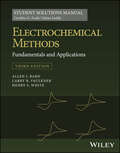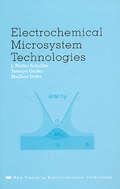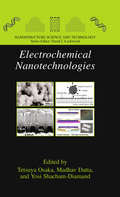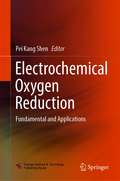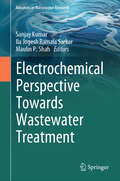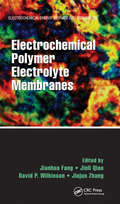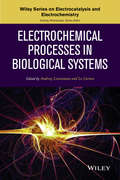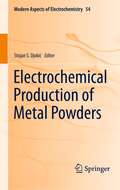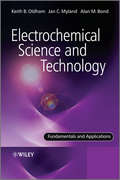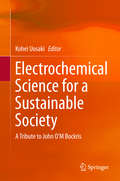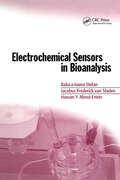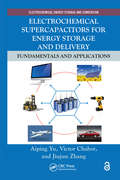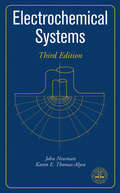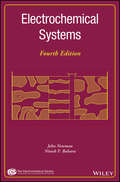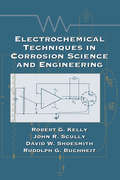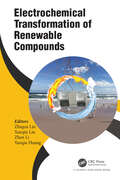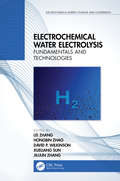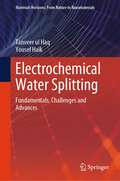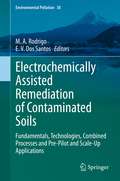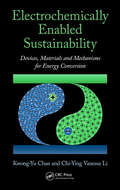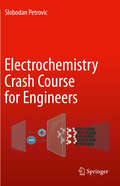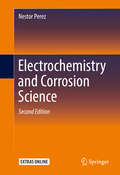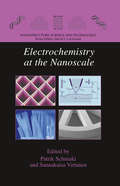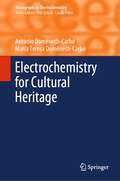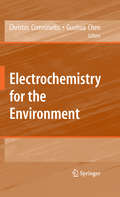- Table View
- List View
Electrochemical Methods: Fundamentals and Applications, 3e Student Solutions Manual
by Allen J. Bard Larry R. Faulkner Cynthia G. Zoski Henry S. White Johna LeddyProvides students with solutions to problems in the 3rd edition of the classic textbook Electrochemical Methods: Fundamentals and Applications Electrochemical Methods is a popular textbook on electrochemistry that takes the reader from the most basic chemical and physical principles, through fundamentals of thermodynamics, kinetics, and mass transfer, all the way to a thorough treatment of all important experimental methods. Holistically, it offers comprehensive coverage of all important topics in the field. To aid in reader comprehension, exercises are included at the end of each chapter which extend concepts introduced in the text or show how experimental data are reduced to fundamental results. This book provides worked solutions for many of the end-of-chapter exercises and is a key resource for any student who makes use of the original textbook.
Electrochemical Microsystem Technologies (New Trends in Electrochemical Technology)
by J.Walter Schultze, Tetsuya OsakaDriven by the electronics industry, electrochemical technology has rapidly evolved, finding increasing applications in microelectronics, batteries, sensors, materials science, industrial fabrication, corrosion, microbiology, neurobiology and medicine. Electrochemical Microsystem Technologies provides an overview of the technological status; the dev
Electrochemical Nanotechnologies
by Madhav Datta Yosi Shacham-Diamand Tetsuya OsakaIn this book, the term "electrochemical nanotechnology" is defined as nanoprocessing by means of electrochemical techniques. This introductory book reviews the application of electrochemical nanotechnologies with the aim of understanding their wider applicability in evolving nanoindustries. These advances have impacted microelectronics, sensors, materials science, and corrosion science, generating new fields of research that promote interaction between biology, medicine, and microelectronics. This volume reviews nanotechnology applications in selected high technology areas with particular emphasis on advances in such areas. Chapters are classified under four different headings: Nanotechnology for energy devices - Nanotechnology for magnetic storage devices - Nanotechnology for bio-chip applications - Nanotechnology for MEMS/Packaging.
Electrochemical Oxygen Reduction: Fundamental and Applications
by Pei Kang ShenThis book discusses systematically the theoretical research and the applications of electrochemical oxygen reduction. Oxygen reduction reaction is a common issue in electrochemistry, but is also an important process involved in the field of energy, cryogenic fuel cells, metal–air cells, oxygen sensors and hydrogen peroxide preparation. This book is divided into 6 chapters; it starts with a description of dynamic mechanisms, followed by a detailed introduction on the related experimental methods and related catalyst preparation technology. By providing the basic methods and testing techniques, and by demonstrating their applications, it helps readers gain a better understanding of oxygen reduction reactions, making it a valuable resource for the industrialization of scientific research achievements. Accordingly, the book appeals to a broad readership, particularly graduate students, those working at universities and research organizations, and industrial researchers.
Electrochemical Perspective Towards Wastewater Treatment (Advances in Wastewater Research)
by Sanjay Kumar Maulin P. Shah Ila Jogesh Ramala SarkarThis book presents electrochemical water treatment methods, which offer ways to find more sustainable solutions. The majority of electrochemical water treatment methods use electricity as the main reactant to conduct the treatment process. Among well-developed electrochemical water treatment methods such as electrocoagulation, electroflotation, electrodialysis, electrochemical oxidation-reduction, there are evolving methods, which show good pre fundamentals for their use in industry-scale applications. These methods increase the removal rates of pollutants, remove drawbacks, extend the applicability of existing electrochemical water treatment methods, and improve cost-efficiency. This book also delivers the improved and enhanced innovative techniques which are economical and efficient for wastewater treatment industry. In addition, the book will envisage the future potential of electrochemical treatment adaptation and a protocol for achieving graded water flexibility and a sustainable future. The main typical reactors used for electrochemical water treatment methods are discussed in this book. Moreover, the volume includes some examples of electrochemical water treatment methods in practice and the activities of some companies working in the field of water treatment. At the same time, design solutions for reactors of developing electrochemical processes are still in the stage of optimization and development, which are presented in the book. There is often a difficulty in selecting the right size of equipment for the treatment of water with given flow rates and concentration of pollutants. This book focuses on the challenges and future tendencies for this highly efficient technology to reach the full-scale implementations as well.
Electrochemical Polymer Electrolyte Membranes (ISSN)
by Jiujun Zhang David P. Wilkinson Jinli Qiao Jianhua FangElectrochemical Polymer Electrolyte Membranes covers PEMs from fundamentals to applications, describing their structure, properties, characterization, synthesis, and use in electrochemical energy storage and solar energy conversion technologies. Featuring chapters authored by leading experts from academia and industry, this authoritative text: Disc
Electrochemical Processes in Biological Systems
by Andrzej Wieckowski Andrzej Lewenstam Lo GortonThe first book to provdie a comprehensive look at bioenergetics, the energy flow in living systems, by studying ion exchange and electron transfer processes in biological membranes and artificial bio-films, and how these processes contribute to developing modern biosensor and ion-sensor technology, as well as biofuel cells. The book: Discusses the ion fluxes and electron transfer processes in biological membranes and artificial bio-films Provides an in-depth description of the processes at the interface between the membrane/film and substrate electrode Is the first of its kind to provide a comprehensive look at how these processes are understood in biology of living cells Addresses how these processes contribute to developing modern biosensor and ion-sensor technology, as well as biofuel cells
Electrochemical Production of Metal Powders
by Stojan S. DjokićThis new volume of Modern Aspects of Electrochemistry reviews different methods for the production of metal powders including mechanical, chemical and electrochemical powders. Electrochemically produced metal powders are of high purity and they are extremely active during sintering. These powders find a wide-range of applications in automotive, aerospace, energy device and electronics industries.
Electrochemical Science and Technology: Fundamentals and Applications
by Jan Myland Keith Oldham Alan BondElectrochemistry is a discipline of wide scientific and technological interest. Scientifically, it explores the electrical properties of materials and especially the interfaces between different kinds of matter. Technologically, electrochemistry touches our lives in many ways that few fully appreciate; for example, materials as diverse as aluminum, nylon, and bleach are manufactured electrochemically, while the batteries that power all manner of appliances, vehicles, and devices are the products of electrochemical research. Other realms in which electrochemical science plays a crucial role include corrosion, the disinfection of water, neurophysiology, sensors, energy storage, semiconductors, the physics of thunderstorms, biomedical analysis, and so on.This book treats electrochemistry as a science in its own right, albeit resting firmly on foundations provided by chemistry, physics, and mathematics. Early chapters discuss the electrical and chemical properties of materials from which electrochemical cells are constructed. The behavior of such cells is addressed in later chapters, with emphasis on the electrodes and the reactions that occur on their surfaces. The role of transport to and from electrodes is a topic that commands attention, because it crucially determines cell efficiency. Final chapters deal with voltammetry, the methodology used to investigate electrode behavior. Interspersed among the more fundamental chapters are chapters devoted to applications of electrochemistry: electrosynthesis, power sources, "green electrochemistry", and corrosion.Electrochemical Science and Technology is addressed to all who have a need to come to grips with the fundamentals of electrochemistry and to learn about some of its applications. It will constitute a text for a senior undergraduate or graduate course in electrochemistry. It also serves as a source of material of interest to scientists and technologists in various fields throughout academia, industry, and government - chemists, physicists, engineers, environmentalists, materials scientists, biologists, and those in related endeavors.This book:Provides a background to electrochemistry, as well as treating the topic itself. Is accessible to all with a foundation in physical science, not solely to chemists. Is addressed both to students and those later in their careers. Features web links (through www.wiley.com/go/EST) to extensive material that is of a more tangential, specialized, or mathematical nature. Includes questions as footnotes to support the reader's evolving comprehension of the material, with fully worked answers provided on the web. Provides web access to Excel® spreadsheets which allow the reader to model electrochemical events. Has a copious Appendix of relevant data.
Electrochemical Science for a Sustainable Society
by Kohei UosakiThis book honors Professor. John O'M. Bockris, presenting authoritative reviews on some of the subjects to which he made significant contributions - i. e. , electrocatalysis, fuel cells, electrochemical theory, electrochemistry of single crystals, in situ techniques, rechargeable batteries, passivity, and solar-fuels - and revealing the roles of electrochemical science and technology in achieving a sustainable society. Electrochemistry has long been an object of study and is now growing in importance, not only because of its fundamental scientific interest but also because of the central role it is expected to play in a future sustainable society. Professor John O'M. Bockris contributed greatly to various aspects of fundamental and applied electrochemistry - such as the structure of the double layer, kinetics and mechanism of the electrochemistry of hydrogen and oxygen, electrocatalysis, adsorption and electrochemical oxidation of small organic molecules, fuel cells, electrocrystallization, theoretical electrochemistry, new methods, photoelectrochemistry, bioelectrochemistry, corrosion and passivity, hydrogen in metals, ionic solutions and ionic liquids, and molten silicates and glasses, as well as socio-economic issues such as the hydrogen economy - for over half a century from 1945 until his retirement in 1997.
Electrochemical Sensors in Bioanalysis
by Raluca-Ioana Stefan"Covers the most recent methods and materials for the construction, validation, analysis, and design of electrochemical sensors for bioanalytical, clinical, and pharmaceutical applications--emphasizing the latest classes of enantioselective electrochemical sensors as well as electrochemical sensors for in vivo and in vitro diagnosis, for DNA assay
Electrochemical Supercapacitors for Energy Storage and Delivery: Fundamentals and Applications (Electrochemical Energy Storage and Conversion #1)
by Jiujun Zhang Aiping Yu Victor ChabotAlthough recognized as an important component of all energy storage and conversion technologies, electrochemical supercapacitators (ES) still face development challenges in order to reach their full potential. A thorough examination of development in the technology during the past decade, Electrochemical Supercapacitors for Energy Storage and Delivery: Fundamentals and Applications provides a comprehensive introduction to the ES from technical and practical aspects and crystallization of the technology, detailing the basics of ES as well as its components and characterization techniques. The book illuminates the practical aspects of understanding and applying the technology within the industry and provides sufficient technical detail of newer materials being developed by experts in the field which may surface in the future. The book discusses the technical challenges and the practical limitations and their associated parameters in ES technology. It also covers the structure and options for device packaging and materials choices such as electrode materials, electrolyte, current collector, and sealants based on comparison of available data. Supplying an in depth understanding of the components, design, and characterization of electrochemical supercapacitors, the book has wide-ranging appeal to industry experts and those new to the field. It can be used as a reference to apply to current work and a resource to foster ideas for new devices that will further the technology as it becomes a larger part of main stream energy storage.
Electrochemical Systems
by John Newman Karen E. Thomas-AlyeaThe new edition of the cornerstone text on electrochemistry Spans all the areas of electrochemistry, from the basics of thermodynamics and electrode kinetics to transport phenomena in electrolytes, metals, and semiconductors. Newly updated and expanded, the Third Edition covers important new treatments, ideas, and technologies while also increasing the book's accessibility for readers in related fields. Rigorous and complete presentation of the fundamental concepts In-depth examples applying the concepts to real-life design problems Homework problems ranging from the reinforcing to the highly thought-provoking Extensive bibliography giving both the historical development of the field and references for the practicing electrochemist.
Electrochemical Systems (The ECS Series of Texts and Monographs)
by John Newman Nitash P. BalsaraProvides a comprehensive understanding of a wide range of systems and topics in electrochemistry This book offers complete coverage of electrochemical theories as they pertain to the understanding of electrochemical systems. It describes the foundations of thermodynamics, chemical kinetics, and transport phenomena—including the electrical potential and charged species. It also shows how to apply electrochemical principles to systems analysis and mathematical modeling. Using these tools, the reader will be able to model mathematically any system of interest and realize quantitative descriptions of the processes involved. This brand new edition of Electrochemical Systems updates all chapters while adding content on lithium battery electrolyte characterization and polymer electrolytes. It also includes a new chapter on impedance spectroscopy. Presented in 4 sections, the book covers: Thermodynamics of Electrochemical Cells, Electrode Kinetics and Other Interfacial Phenomena, Transport Processes in Electrolytic Solutions, and Current Distribution and Mass Transfer in Electrochemical Systems. It also features three appendixes containing information on: Partial Molar Volumes, Vectors and Tensors, and Numerical Solution of Coupled, Ordinary Differential Equations. Details fundamental knowledge with a thorough methodology Thoroughly updated throughout with new material on topics including lithium battery electrolyte characterization, impedance analysis, and polymer electrolytes Includes a discussion of equilibration of a charged polymer material and an electrolytic solution (the Donnan equilibrium) A peerless classic on electrochemical engineering Electrochemical Systems, Fourth Edition is an excellent resource for students, scientists, and researchers involved in electrochemical engineering.
Electrochemical Techniques in Corrosion Science and Engineering (Corrosion Technology Ser. #Vol. 18)
by Rudolph G. Buchheit Robert G. Kelly John R. Scully David ShoesmithThis book describes the origin, use, and limitations of electrochemical phase diagrams, testing schemes for active, passive, and localized corrosion, the development and electrochemical characterization of passivity, and methods in process alteration, failure prediction, and materials selection. It offers useful guidelines for assessing the efficac
Electrochemical Transformation of Renewable Compounds
by Zhiqun Lin Zhen Li Xueqin Liu Yanqiu HuangElectrochemical conversion process can be used to generate power, store energy and synthesize chemicals, which plays a key role in the development of sustainable energy resources. Electrochemical Transformation of Renewable Compounds presents the basic fundamentals of different electrochemical transformations for clean energy and places significant emphasis on the key developments of various electrochemical processes using state-of-the-art materials. Written by electrochemical energy scientists who have worked on the application of electrocatalysis in the environmental and energy area, this book provides comprehensive coverage of main electrochemical transformation processes, including oxygen evolution, hydrogen generation, oxygen reduction, carbon dioxide reduction, nitrogen reduction, methanol oxidation, urea oxidation and ammonia oxidation.
Electrochemical Water Electrolysis: Fundamentals and Technologies (Electrochemical Energy Storage and Conversion)
by Lei Zhang Jiujun Zhang Xueliang Sun David P. Wilkinson Hongbin ZhaoThis book comprehensively describes the fundamentals of electrochemical water electrolysis as well as the latest materials and technological developments. It addresses a variety of topics such as electrochemical processes, materials, components, assembly and manufacturing, and degradation mechanisms, as well as challenges and strategies. It also includes an understanding of how materials and technologies for electrochemical water electrolysis have developed in recent years, and it describes the progress in improving performance and providing benefits to energy systems and applications. Features the most recent advances in electrochemical water electrolysis to produce hydrogen Discusses cutting-edge materials and technologies for electrochemical water electrolysis Includes both experimental and theoretical approaches that can be used to guide and promote materials as well as technological development for electrochemical water electrolysis Comprises work from international leading scientists active in electrochemical energy and environmental research and development Provides invaluable information that will benefit readers from both academia and industry With contributions from researchers at the top of their fields, the book includes in-depth discussions covering the engineering of components and applied devices, making this an essential read for scientists and engineers working in the development of electrochemical energy devices and related disciplines.
Electrochemical Water Splitting: Fundamentals, Challenges and Advances (Materials Horizons: From Nature to Nanomaterials)
by Yousef Haik Tanveer ul HaqThis book provides a comprehensive platform for the research, scientific and educational communities working on electrocatalysis. It covers water electrolysis from different fields of catalysis research, deals with the fundamentals and critically discusses the precise and correct use of evaluating parameters and their calculation for a fair evaluation. Readers find an analysis to probe the origin of different bottlenecks in water electrolysis and scientific methods to enhance the electrode selectivity with high intrinsic activity, effective mass and electron transfer ability, abundant active sites with super hydrophilicity-aerophobicity characteristics and structural, mechanical and chemical stability with high corrosion resistance.
Electrochemically Assisted Remediation of Contaminated Soils: Fundamentals, Technologies, Combined Processes and Pre-Pilot and Scale-Up Applications (Environmental Pollution #30)
by M. A. Rodrigo E. V. Dos SantosThis book provides an overview of the current development status of remediation technologies involving electrochemical processes, which are used to clean up soils that are contaminated with different types of contaminants (organics, inorganics, metalloids and radioactive). Written by internationally recognized experts, it comprises 21 chapters describing the characteristics and theoretical foundations of various electrochemical applications of soil remediation. The book’s opening section discusses the fundamental properties and characteristics of the soil, which are essential to understand the processes that can most effectively remove organic and inorganic compounds. This part also focuses on the primary processes that contribute to the application of electrochemically assisted remediation, hydrodynamic aspects and kinetics of contaminants in the soil. It also reviews the techniques that have been developed for the treatment of contaminated soils using electrochemistry, and discusses different strategies used to enhance performance, the type of electrode and electrolyte, and the most important operating conditions. In turn, the book’s second part deals with practical applications of technologies related to the separation of pollutants from soil. Special emphasis is given to the characteristics of these technologies regarding transport of the contaminants and soil toxicity after treatment. The third part is dedicated to new technologies, including electrokinetic remediation and hybrid approaches, for the treatment of emerging contaminants by ex-situ and in-situ production of strong oxidant species used for soil remediation. It also discusses pre-pilot scale for soil treatment and the use of solar photovoltaic panels as an energy source for powering electrochemical systems, which can reduce both the investment and maintenance costs of electrochemically assisted processes.
Electrochemically Enabled Sustainability: Devices, Materials and Mechanisms for Energy Conversion
by Kwong-Yu Chan Chi-Ying Vanessa LiWith contributions from leading researchers in their fields, this book provides an overview of the most important electrochemical power sources in development today. Focusing on materials, design, and performance, the text presents the most recent and innovative technologies employed in battery and fuel cell technologies. Topics include acid-alkaline batteries, microbial fuel cells, lithium batteries, lead acid batteries, ultracapacitors, vanadium flow batteries, and carbon dioxide electroreduction. The book discusses the advantages of these cells over conventional methodologies, and their future applications.
Electrochemistry Crash Course for Engineers
by Slobodan PetrovicThis book is a concise introductory guide to understanding the foundations of electrochemistry. By using simplified classroom-tested methods developed while teaching the subject to engineering students, the author explains in simple language an otherwise complex subject that can be difficult to master for most. It provides readers with an understanding of important electrochemical processes and practical industrial applications, such as electrolysis processes, metal electrowinning, corrosion and analytical applications, and galvanic cells such as batteries, fuel cells, and supercapacitors. This powerful tutorial is a great resource for students, engineers, technicians, and other busy professionals who need to quickly acquire a solid understanding of the science of electrochemistry.
Electrochemistry and Corrosion Science
by Nestor PerezThe second edition of this textbook includes refined text in each chapter, new sections on corrosion of steel-reinforced concrete and on cathodic protection of steel reinforced bars embedded in concrete, and some new solved examples. The book introduces mathematical and engineering approximation schemes for describing the thermodynamics and kinetics of electrochemical systems, which are the essence of corrosion science, in addition to electrochemical corrosion, forms of corrosion and mechanisms of corrosion. This approach should capture the reader's attention on the complexity of corrosion. Thus, the principles of electrochemistry and electrochemical cells are subsequently characterized in simple electrolytes from a thermodynamics point of view.
Electrochemistry at the Nanoscale
by Patrik Schmuki Sannakaisa VirtanenFor centuries, electrochemistry has played a key role in technologically important areas such as electroplating or corrosion. In recent decades, electrochemical methods are receiving increasing attention in important strongly growing fields of science and technology such as nanosciences (nanoelectrochemistry) and life-sciences (organic and biological electrochemistry). Characterization, modification and understanding of various electrochemical interfaces or electrochemical processes at the nanoscale, has led to a huge increase of the scientific interest in electrochemical mechanisms as well as of application of electrochemical methods in novel technologies. This book presents exciting emerging scientific and technological aspects of the introduction of the nanodimension in electrochemical approaches are presented in 12 chapters/subchapters.
Electrochemistry for Cultural Heritage (Monographs in Electrochemistry)
by Antonio Doménech-Carbó María Teresa Doménech-CarbóThis monograph overviews the importance of electrochemistry in the field of cultural heritage, including archaeology, conservation and restoration topics. The application of electrochemical techniques in these domains have experienced a notable growth during the last ten years, in particular with regards to the elucidation of composition, manufacturing techniques and chronology of archaeological artefacts. This book describes the application of solid state electrochemistry techniques for the use of samples at the nanogram level from paintings, metallic, ceramic, glass, glazed, wooden, and other objects, and it also includes the description of new dating procedures for archaeological objects made of these materials. It is a valuable contribution to the field of cultural heritage and will be of great interest to archaeologists, conservators and restorers as well as to physicists and chemists working on the scientific examination of works of art.
Electrochemistry for the Environment
by Christos Comninellis Guohua ChenThe book starts with the fundamentals of environmental electrochemistry, introducing the basic techniques in selecting and fabricating electrode materials, followed by a theoretical analysis of the electrochemical processes, green electrochemical operation, discussion of electrochemical technologies in water treatment, and then examination of the established wastewater treatment technologies such as electrochemical reactors for metal recovery, electrocoagulation, electroflotation and electrooxidation. Emerging technologies such as electrophotooxidation, electro disinfection, and electrochemical technologies in sludge and soil treatment will also be analyzed. This book will be an excellent reference for young researchers starting new research programs and also for industrialists who wish to appreciate the technologies.
